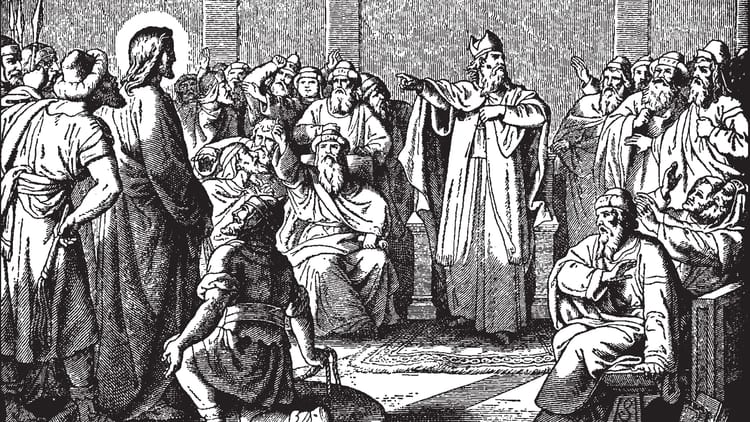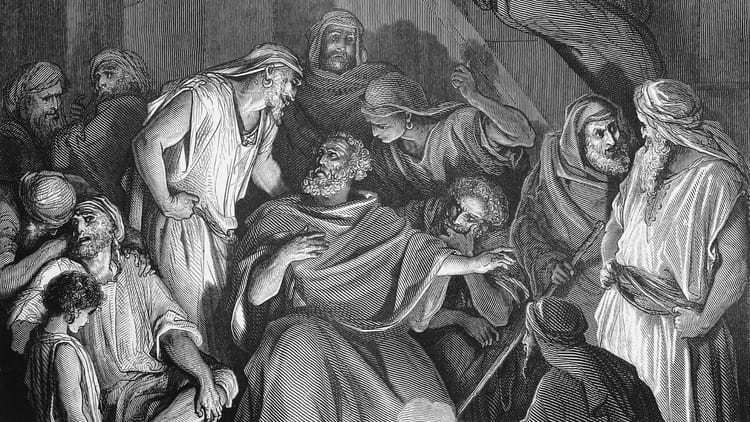The Empty Tomb (Mark 16:1-8)

On Friday, things couldn’t have been any worse. Jesus Christ, who had been preaching and healing for three years, had been completely abandoned by even his closest friends. One of the twelve people closest to him had betrayed him. One of his three closest friends had cursed, saying that he didn’t have anything to do with Jesus. His family did not even believe. The story was over. Jesus had joined the history heap. He was just one of countless messiahs who came, built up a following, and then flamed out. If the Gospel of Mark ended at chapter 15, Jesus would only be a small part of history, maybe mentioned briefly in an old text but nothing more.re.
But just when things are at their worst, everything changes. In just 8 verses, Mark shows us that everything has changed. In these 8 verses we’re going to see that Easter was a surprise; that Easter includes us; and that the Easter story continues.
First: Easter is a surprise.
If you had lived at the time of Jesus, you would have understood that Jesus was just one of many messianic figures who came, and ended up dying disappointing deaths. For instance, Simon bar Kokhba led a revolt against the Roman Empire in 132 AD. He set up an independent Jewish state, and ruled for three years as ruler. But his revolt was eventually crushed, and today his name is hardly known. After the failure of the revolt, rabbinical writers began referring to him by a new name. Instead of calling him Bar Kokhba (“Son of a Star”) they started calling him Bar Kozeba (“Son of the disappointment”). If the story of Jesus ended in Mark 15, this would have been the story of Jesus as well. Disappointment. Failure. End of story.
Now, Jesus had told his disciples over and over again what was going to happen.
“We are going up to Jerusalem,” he said, “and the Son of Man will be delivered over to the chief priests and the teachers of the law. They will condemn him to death and will hand him over to the Gentiles, who will mock him and spit on him, flog him and kill him. Three days later he will rise.” (Mark 10:33-34)
Here it is the third day, and absolutely nobody has even considered the possibility that what Jesus said would come true. His disciples are scattered. In verse 1 of this passage, three women come as soon as they can, early in the morning, with spices to anoint the body of Jesus. These spices would be very costly. They were designed to help deal with the stench that a decaying body would create. Nobody is expecting a resurrection. They expect to find a bloodied and decaying body there. Not a single person expected anything other than a dead body. As far as they were concerned, the story was over. Theologically, they didn’t even believe that a resurrection could even take place in this age. That is something that the Jewish people believed would take place at the end of history. They certainly didn’t expect Jesus to be risen from the dead.
Sometimes we make the mistake of reading the Bible and thinking that of course ancient people could accept the story of someone rising from the dead, and now we’re so much more sophisticated. What you need to understand is that nobody back then expected the resurrection of Jesus. They didn’t even have categories for it. When other leaders were killed, nobody thought to make up a story of resurrection.
The people in Mark didn’t get it either, and yet something happened to transform them completely. A group of first-century Jews who were scattered and defeated and had no category for the resurrection were suddenly changed to emboldened witnesses who were prepared to give up their lives speaking about what they’d seen. As Pascal put it, “I [believe] those witnesses that get their throats cut.” Virtually all the disciples and early Christian leaders gave up their lives testifying to the resurrection of Jesus. Something happened on Easter morning that nobody had expected that changed everything.
If you’re here this morning, and you have a hard time believing the resurrection, join the club. There’s not a person in the Gospel of Mark who expected it to happen. But something happened that changed everything – and is still changing everything today. Easter is a surprise.
But then, secondly, we see:
Easter includes us.
Mark 16:1 says, “When the Sabbath was over, Mary Magdalene, Mary the mother of James, and Salome bought spices so that they might go to anoint Jesus’ body.”
It’s easy to miss how shocking this is. These women had been witnesses of Jesus’ death. “Some women were watching from a distance. Among them were Mary Magdalene, Mary the mother of James the younger and of Joseph, and Salome” (Mark 15:40). Two of them, according to Mark 15:47, witnessed where Jesus was buried. Now these three women are about to become the first witnesses to the empty tomb, and to the message of the angel.
What’s so surprising about this? In Jesus’ day, women were viewed as being unreliable witnesses. Their testimony was not considered admissible evidence. N.T. Wright makes the point that if you were inventing the story of the resurrection, you never would have made the first and best witnesses to be female. It would have been too inconvenient. The only reason you would say that women were the first and best witnesses is because that’s what actually happened. It’s there because it’s true.
But it’s surprising for another reason. The readers of Mark’s Gospel would have understood that one of these three women, at least, was a woman with a past. Mary Magdalene was somebody who had previously been demon possessed. Luke 8:2 calls her “Mary (called Magdalene) from whom seven demons had come out.” At least one of these three women is somebody who has a history.
What does this tell us? Mark is showing us how the gospel turns things upside-down. People who are excluded, who are pushed to the side, are the first and best witnesses of the death, burial, and resurrection of Jesus. The least likely people become part of the Easter story. You may be here this morning thinking that you’re the least likely person. The first to be discounted in human society are the first to be included in divine society.
And just in case we get ahead of ourselves, Mark still points out that we won’t get it right away. These women go to the tomb. They enter into a small chamber in the tomb and see a young man sitting there. This young man – an angel – announces the resurrection of Jesus Christ. They’re told to go tell the disciples. All along, Jesus has told people not to tell people about him. Jesus commanded people to silence, and they spoke. Now, they’re compelled to speak, and what do they do? Verse 8 says, “Trembling and bewildered, the women went out and fled from the tomb. They said nothing to anyone, because they were afraid.” Easter is for the least likely people, but even the best of us blow it. The Resurrection changes us. The gospel changes us. But it’s a process. Easter includes people like us, people who are the least likely to be included, people who still blunder in our responses to God and who don’t get it right away.
What about the disciples? The angel told the women, "But go, tell his disciples and Peter, ‘He is going ahead of you into Galilee. There you will see him, just as he told you'" (Mark 16:7). Before Jesus was betrayed, he told his disciples:
“You will all fall away,” Jesus told them, “for it is written:
“‘I will strike the shepherd,
and the sheep will be scattered.’
But after I have risen, I will go ahead of you into Galilee.” (Mark 14:27-28)
The disciples had completely blown it. Jesus had told them over and over again what was going to happen, and they just couldn’t get it. And when put to the test, they caved and they fled.
And out of all the disciples, no failure was more dramatic than Peter’s. Peter had sworn emphatically, “Even if I have to die with you, I will never disown you” (Mark 14:31). But when the moment came, Peter denied even knowing Jesus. Out of all the disciples, except for Judas, Peter knew that he had let Jesus down profoundly.
Yet the message was, “But go, tell his disciples and Peter, ‘He is going ahead of you into Galilee. There you will see him, just as he told you.'” You see what this means? Jesus hasn’t written Peter and the other disciples off.
Easter includes unlikely people. It includes people who blunder. It even includes people who have completely and utterly failed. Easter includes people just like us.
That’s what Mark has been showing us so far. Easter is a surprise. It caught everyone by surprise. Nobody expected. And Easter includes us – the unlikely ones, the blundering ones, the failures. There’s one more thing Mark shows us:
Finally: the Easter story continues.
You’ll notice this morning that we’ve looked at verses 1 to 8. There’s a reason. The oldest and most reliable manuscripts end at verse 8. Early church fathers don’t seem to know anything beyond verse 8. It seems like the last verse we have that authentically and originally comes from the pen of Mark is verse 8. Verses 9 to 20 seem to have been added later as a way to smooth out the ending.
I don’t want to get into all the theories this morning about why Mark ends the way it does. Some think Mark meant to end this way. Others think that something happened – Mark wasn’t able to complete his book, or what he originally wrote was lost. In a sense it doesn’t matter. We learn a lot about what happened from the other records. No doctrine is affected no matter what we conclude about the abrupt ending of the Gospel of Mark.
But you have to agree that it’s a strange way to end. Women come to the tomb and find the stone rolled away. They meet an angelic messenger who tells them that Jesus is risen, and he gives them a message to pass on to the disciples. Jesus is alive, and he’s going to reconvene his community. The story continues. And then: “Trembling and bewildered, the women went out and fled from the tomb. They said nothing to anyone, because they were afraid.” The end. Amen. Let’s pray.
What a strange way to end the book! You can see why they’d try to neaten the ending and smooth it out.
But let’s think for a minute. Those who first read Mark’s Gospel would have known that this wasn’t the end of the story. They would have heard the stories of Jesus’ resurrection appearances. The very fact that the Gospel of Mark had been written would have been evidence that this wasn’t the end of the story. Easter Sunday had set in motion a series of events that had transformed the disciples. Somebody points out that you have all the raw materials you need: an empty tomb, the young men’s message, Jesus’ indication that he’s not done with his disciples yet. It’s left to us to pull it together and to trace the line from what happened then to where we are today.
No matter how you understand the ending of the Gospel of Mark, it points out that Easter Sunday was not the end of the story. It’s only the beginning. The resurrection of Jesus set in motion a new story that has not yet finished or resolved. It’s a story that includes us today.
In a sense, Mark’s Gospel ends at verse 8. For all we know, there was more, but we don’t know. What we have ends, though at verse 8. But the story that Mark has begun to tell is a story that continues right to the present day. Jesus has been raised from the dead. It’s taken us all by surprise. And Jesus is calling the most unlikely people – people who have let him down – to join his community of followers, and to announce the good news that Jesus is alive and has finished his work. The Gospel of Mark is over, but the story isn’t. The story continues to this very day, and it includes you.
I’m glad that Mark ends with the disciples scattered and the women scared. I’m glad because we know that it doesn’t end there. God transformed them into a group of people who, through the power of the Spirit, turned the world upside-down.
But it gives me hope, because some of us are scattered and afraid today. There’s hope for us too. Easter may be a surprise, but the Easter story includes you in. It pulls you in, so you see that Jesus has risen, and is alive, and the story continues. And it’s a story that includes you.
Father, thank you for Easter. We’ve seen that Jesus bore our sins and our shame. But we’ve seen today that this isn’t the end of the story. Jesus also rose to give us new life. You vindicated him, and he now sits at your right hand as King.
But you take us – those who are caught off guard, those of us who don’t matter, who blunder in our responses, who flat-out fail you – and you pull us into the story. You take us and use us to change the world, not because we’re strong, but because Jesus is risen.
So change us. Would you draw some of us even now into this story. We thank you for Jesus, for what he did. We thank you that he lives. And we pray in his name, the name of the risen and reigning King. Amen.





